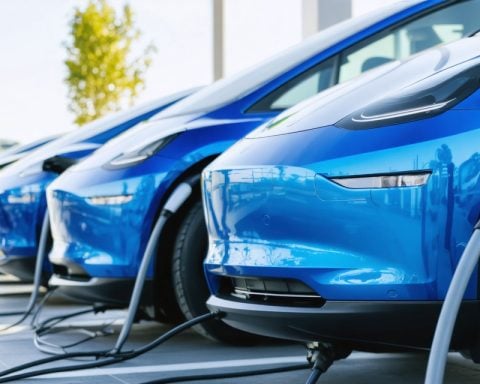Major Advancements in Energy Storage
In a groundbreaking move for renewable energy, Spain has announced the addition of over 182 MW of battery energy storage systems (BESS) to enhance its solar and wind generation capabilities. This initiative was recently highlighted in the Official State Gazette (BOE), marking a significant step towards cleaner energy.
Leading the charge is Iberdrola, which has secured prior administrative authorization for several key projects. Among these, the 27.46 MW FV Revilla-Vallejera Hybrid battery storage module stands out. This system will work in synergy with the existing 44.199 MW FV Revilla-Vallejera photovoltaic setup located in Burgos. Additionally, plans for the Hibridación FV Olmedilla BESS, also featuring a capacity of 27.46 MW, are in motion. This storage unit will be integrated with the current 42 MW FV Olmedilla solar park.
Furthermore, the proposed Hibridación FV Romeral, which matches the 27.46 MW capacity for integration with the 42 MW FV Romeral solar park in Cuenca, rounds out this impressive roster of projects. Each of these systems comes with the necessary infrastructure for effective electricity evacuation, ensuring efficiency and reliability in power distribution.
As these projects come to fruition, Spain is firmly positioning itself at the forefront of renewable energy innovation, paving the way for a sustainable future while reducing dependence on fossil fuels.
Major Advancements in Energy Storage: Paving the Way for a Sustainable Future
The recent announcement from Spain regarding the addition of over 182 MW of battery energy storage systems (BESS) signifies a milestone in renewable energy production. With established projects from Iberdrola including the Revilla-Vallejera Hybrid, Olmedilla BESS, and Romeral installations, this initiative not only boosts solar and wind generation capabilities but also holds profound implications for the environment, humanity, and the global economy.
The introduction of advanced energy storage technologies plays a critical role in transforming the energy landscape. One of the most significant impacts of this development is the enhancement of grid stability. Renewable energy sources like solar and wind are inherently intermittent; they produce energy based on sunlight and wind availability, which can lead to fluctuations in power supply. By integrating battery storage systems, excess energy generated during peak production times can be stored and dispatched when demand is high or production is low. This capability reduces the reliance on fossil fuel backup systems that typically respond to energy shortfalls, consequently diminishing carbon emissions and combating climate change.
From an environmental perspective, the shift towards renewable energy and energy storage technologies marks a vital step towards sustainable development. With the capacity to store and utilize renewable energy more effectively, countries can lower their greenhouse gas emissions, improve air quality, and minimize the ecological footprint of energy production. As Spain pioneers these advancements, the international community can look to its model as a viable roadmap toward reducing climate change impacts, enhancing biodiversity, and preserving natural resources for future generations.
Humanity stands to benefit greatly from this transition as well. Improved access to stable and sustainable energy can drive socio-economic development in underprivileged areas. By harnessing renewable energy, regions with less access to traditional energy sources can leapfrog to cleaner, more sustainable energy solutions, which can elevate living standards, create jobs, and foster economic growth. Energy independence achieved through renewables can also lead to geopolitical stability, reducing countries’ reliance on fossil fuel imports from regions with unstable or contentious political climates.
Looking at the economic ramifications, the investment in battery storage and renewable energy projects offers substantial opportunities for growth in the green economy. The jobs created in manufacturing, installation, and maintenance of these systems contribute to local and national economies. Furthermore, as global demand for renewable energy continues to rise, early adopters like Spain can benefit from being at the forefront of technological innovation and exportation, securing their position in the burgeoning market for clean energy solutions.
Connections to the future of humanity are undeniable. As countries around the world grapple with the urgent need for sustainable energy solutions, the practices instituted in Spain could shape global energy policies and inspire concerted efforts towards climate action. By addressing the challenges of energy storage and distribution, nations can collectively work towards a greener, more resilient future, securing a better quality of life for generations to come. In essence, advancements in energy storage are not merely technological updates; they are critical components of a holistic approach to ensuring a sustainable and equitable future for humanity.
Spain’s Pioneering Move: Transforming Renewable Energy with Massive Battery Storage Systems
Major Advancements in Energy Storage
Spain is making waves in the renewable energy sector with a major announcement aiming to add over 182 MW of battery energy storage systems (BESS). This significant initiative, detailed in the Official State Gazette (BOE), highlights Spain’s commitment to enhancing its solar and wind power generation capabilities, a pivotal step toward a cleaner energy future.
Key Features of the Battery Energy Storage Systems
– Iberdrola Leadership: As a leader in this initiative, Iberdrola has received prior administrative authorization for several ambitious projects. Their commitment to integrating energy storage solutions supports the country’s renewable energy targets.
– Notable Projects:
– FV Revilla-Vallejera Hybrid BESS: With a capacity of 27.46 MW, this storage module will enhance the existing 44.199 MW solar installation in Burgos.
– Hibridación FV Olmedilla: Another 27.46 MW BESS planned to work alongside the 42 MW FV Olmedilla solar park.
– Hibridación FV Romeral: Matching the aforementioned capacity, this system will complement the 42 MW FV Romeral solar park in Cuenca.
Use Cases and Innovations
The newly proposed systems will not only aid in energy retention during low production periods but also help stabilize the grid by managing supply and demand efficiently. This technological advancement promises to optimize the use of renewable energy sources, thereby maximizing output and ensuring power availability during peak times.
Benefits of Battery Energy Storage Systems
– Enhanced Reliability: By storing solar and wind energy, BESS provides a buffer against fluctuations in generation, securing a stable energy supply.
– Environmental Impact: This shift reduces dependence on fossil fuels, aligning with global sustainability efforts and decreasing greenhouse gas emissions.
Market Trends and Insights
The global energy storage market is witnessing a significant transformation, anticipated to grow drastically as countries pursue ambitious renewable energy targets. Spain’s initiatives are a part of this larger trend, reflecting increasing investment in energy storage technologies.
Limitations and Considerations
While BESS presents numerous advantages, there are challenges to consider:
– Initial Costs: The use of advanced battery technologies can require substantial upfront investment.
– Sustainability of Materials: The production and disposal of batteries raise concerns about resource extraction and long-term sustainability.
Future Predictions
Experts predict that as these battery systems become more cost-effective and efficient, we may see a rapid increase in deployment across Europe. This could pave the way for other countries to follow suit, enhancing global renewable energy stability.
For more insights on renewable energy advancements, visit Iberdrola for updates and detailed information.
In summary, Spain’s strategic enhancement of energy storage capabilities not only positions the country as a leader in the renewable energy sector but also sets a precedent for sustainable energy practices globally.













